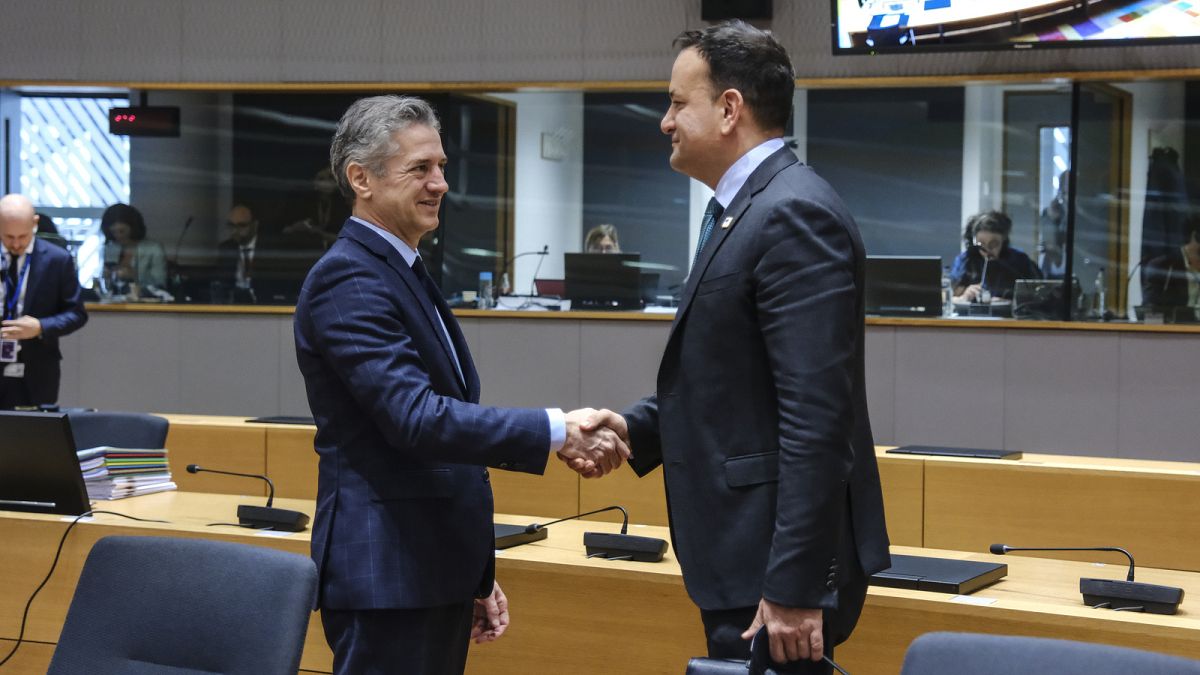Spain, Ireland, Slovenia, Malta say they are ready to recognise the State of Palestine
The leaders of Spain, Ireland, Slovenia and Malta have announced they stand ready to recognise the State of Palestine as the “only way to achieve peace and security” in the war-ridden region. The four leaders gathered on the margins of a summit in Brussels on Friday to discuss their “readiness to recognise Palestine,” adding they stand […]


The leaders of Spain, Ireland, Slovenia and Malta have announced they stand ready to recognise the State of Palestine as the “only way to achieve peace and security” in the war-ridden region.
The four leaders gathered on the margins of a summit in Brussels on Friday to discuss their “readiness to recognise Palestine,” adding they stand ready to do so “when it can make a positive contribution and the circumstances are right.”
“We are agreed that the only way to achieve lasting peace and stability in the region is through implementation of a two-state solution, with Israeli and Palestinian States living side-by-side, in peace and security,” a joint statement by the four heads of government reads.
Speaking after the summit, Slovenian Prime Minister Robert Golob said he believed a lot could be done “in the next week” to strengthen political backing for a Palestinian state in the United Nations. Golob added he was “sure” that the moment when conditions for establishing a new government in Palestine will be “ripe” could be “a few weeks, maybe a month” away.
Nine of the EU’s 27 member states currently recognise Palestinians’ right to a state according to the so-called 1967 borders, which includes the West Bank, the Gaza Strip and East Jerusalem.
Malta, along with eastern states such as Bulgaria, the Czech Republic, Romania and Slovakia, have recognised the Palestinians’ right to statehood since 1988. In 2014, Sweden became the first member state to unilaterally recognise Palestinians’ right to statehood while a member of the bloc.
The Slovenian premier confirmed a representative also attended the meeting on behalf of the Belgian government, seen as another staunch supporter of Palestinians’ fight for statehood.
Belgium currently holds the 6-month rotating Presidency of the Council of the EU, responsible for overseeing its work and therefore likely restricted from signing such declarations.
Although the European Union supports the so-called two-state solution – which would deliver statehood for Palestinians – and is the single biggest donor of aid to Palestinians, it has not yet unanimously backed the recognition of a Palestinian state.
“The debate on the recognition of Palestine was not on the table,” European Council President Charles Michel explained on Friday.
“But I will share with you what I think about it. I think that if the idea is to start a kind of process so it’s possible to take into account steps that could be made on both sides – by the Palestinian Authority, for instance, and by Israel – then it could be a useful process.”
Spain, Ireland spearhead push for EU recognition of Palestine
Since the outbreak of the war in Gaza, both Ireland and Spain have repeatedly expressed readiness to recognise Palestine, and spearheaded efforts to toughen the EU’s stance on Israel in response to the excessive loss of life in Gaza.
In a breakthrough on Thursday, the EU’s 27 leaders unanimously called for a ceasefire in Gaza for the first time since the outbreak of the war between Israel and Hamas.
Last November, Spanish Prime Minister Pedro Sánchez vowed that his newly formed government would make the recognition of Palestinian statehood its main priority in terms of foreign policy.
Speaking after the Brussels summit on Friday, Sánchez suggested to reporters that Spain preferred to move in lockstep with other EU countries rather than recognising a Palestinian state unilaterally, an idea it has flirted with in the past.
“We want to take this step united. It’s a decisive step in order to lay the foundations of a lasting peace,” he said, adding that the EU should “carefully calibrate” the right moment to take the step.
Sánchez also suggested that the fact the four leaders represented all sides of the political spectrum – with Spain and Malta governed by centre-left parties, Slovenia by a Liberal party, and Ireland by a centre-right party – showed there was broad political consensus that the recognition of Palestine is necessary for any future peace process.
In February, Irish Taoiseach Leo Varadkar also confirmed a group of member states were in talks to formally recognise Palestine to enable “a more equal negotiation to happen” when the war raging in Gaza comes to an end.
This article was corrected to clarify that Malta has not yet recognised a Palestinian state, but rather the concept of Palestinian statehood. It has also been__with comments from leaders.














